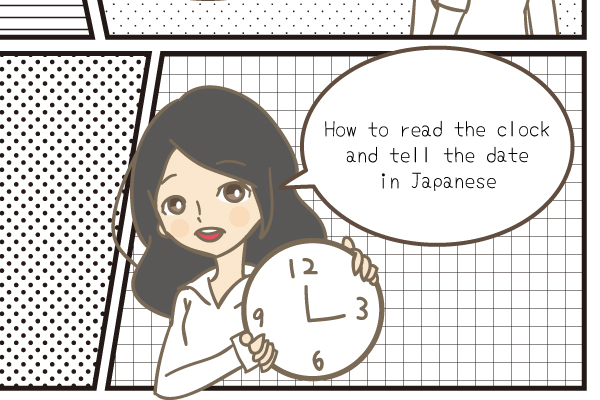How to read the clock and tell the date in Japanese
Last time we looked and numerals in Japanese and learned how to count up to 10,000. In this lesson, we look at reading the clock and telling the date in Japanese – so you can practice putting those numerals you learned last time to use!
| Table of Contents [What time is it?] [What time is it, more specifically?] [What’s the date today?] |
[What time is it?]
The signifier to tell the time or hour in Japanese is the word “時” – it’s the “時” from “時間 (time)”. To indicate what time you are referring to, all you need to do is put the according number in front of “時”. For example “いち (one)” plus “時” equals “いち時 (one am/pm)”.
However, there are two things you need to take care of
1.Readings
Some numbers have several readings, as you have learned last time. Do you still remember which numbers that are? It’s the following four numbers:
| 0 | ゼロ、れい |
| 4 | よん、し、よ |
| 7 | なな、しち |
| 9 | きゅう、く |
For telling the time with these numbers, the reading is set to the following:
| 4 am/pm | よ時 |
| 7 am/pm | しち時 |
| 9 am/pm | く時 |
2.Specifying am/pm
As you may have already noticed, simply putting a number in front of “時” does not specify whether the indicated time refers to am or pm. This is the second point to be aware of. If you want to specify whether you are talking about am or pm, you can say “午前 (am)” and “午後 (pm)” before stating the time. For example
| 1 am | 午前いち時 |
| 1 pm | 午後いち時 |
Alternatively, you can also use all of the numbers until 24 to state the time in the Japanese language. If you state the time like that, there is no need to use “午前” and “午後” before saying the time. For example:
| 13:00 / 1pm | じゅうさん時/13時 |
| 21:00 / 9pm | にじゅういち時/21時 |
However, this kind of way to state the time is more often used in writing than in daily conversation. In conversation, you use “午前” and “午後” to specify what time you are talking about – or, as in most languages, it is already implied by the context, in which case you don’t need to specify it.
[adsense]
[What time is it, more specifically?]
Now, what do you do if you need to state the time more specifically than just by the hour? Let’s take a look at how to add some minutes to your hours!
Just like you just put the numbers you learned last time in front of “時” to indicate the hour, you can do the same with “分 (minute)” to indicate the minutes. So, for example:
| 7:15 | しち時じゅうご分/7時15分 |
Depending on which number you combine with “分” the reading changes a little, so you will need to remember this:
| いっぷん | 1分 |
| にふん | 2分 |
| さんふん | 3分 |
| よんふん | 4分 |
| ごふん | 5分 |
| ろっぷん | 6分 |
| ななふん | 7分 |
| はっぷん | 8分 |
| きゅうふん | 9分 |
| じゅっぷん | 10分 |
But, as always, there are also some irregularities and alternatives to watch out for.
If you would like to state a half hour, you can of course simply state the time as “4時30分”. Alternatively, you can use “半 (half)”, similarly to when you say “half” past four in English.
| 4:30, half past four | 4時半 |
| 8:30, half past eight | 8時半 |
Here are a few times for you to practice. Find the correct readings below!
| 9:00 | く時 |
| 18:15 | じゅうはち時じゅうご分 |
| 4:00 (am) | 午前よ時 |
| 12:59 (pm) | 午後じゅうに時ごじゅうきゅう分 |
| 7:30 (am) | 午前しち時半 |
| 14:27 | じゅうよ時にじゅうなな分 |
[What’s the date today?]
For stating the date, the first ten days of the month as well as the 20th have special ways of saying them. In this video, Shiho talks about these irregular days and how to use them. This makes sense, as the regular way of stating the date is fairly easy, while it does take some time getting used to these irregulars.
For example, in written form, stating the “1st” of a month is written as “1日”. “日” is read as “にち”, so the logically conclusion would be to read “1日” as “いちにち”. However, it is actually read as “ついたち”. Check out the full list of irregular days below:
| 1日 | ついたち |
| 2日 | ふつか |
| 3日 | みっか |
| 4日 | よっか |
| 5日 | いつか |
| 6日 | むいか |
| 7日 | なのか |
| 8日 | ようか |
| 9日 | ここのか |
| 10日 | とおか |
| 20日 | はつか |
There are two more days to watch out for. “14日” and “24日” both also have special readings, but you can also read them regularly. Both readings are correct and in use, but the irregular reading is used slightly more commonly.
| 14日 | じゅうよっか じゅうよんにち |
| 24日 | にじゅうよっか にじゅうよんにち |
| 時 | Hour |
| 分 | Minute |
| 時間 | Time |
| 日付 | Date |
| 表す | To signify, to stand for, to express |
| 気を付ける | To take care |
| 正解 | Right answer, correct answer |
| 日常 | Everyday, ordinary, regular |

How to count and use numbers and numerals in Japanese

How to use demonstrative pronouns in Japanese



